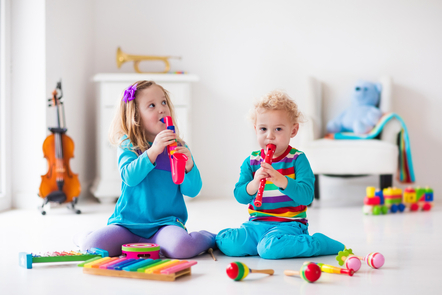New York, NY (Top40 Charts) Music is practically all around us and an essential aspect of our culture, which is present in areas such as holiday celebrations, live performances, worship centers, shows, national holidays, etc. At home, music is a significant part of everyday learning and gaining new experiences. Right from birth, most parents turn to music to soothe their babies to sleep, or as an expression of joy/ love to interact with the child.
As a parent/ guardian, you take full advantage of such instincts by learning more about how the music for early childhood development can impact your baby's development. Among the most notable benefits is better social skills. This is made even more manageable as most young children seem to have a somewhat natural inclination towards music, be it through rhymes, songs, or playing an instrument.
Undoubtedly, we have all experienced the joy children experience when or banging away on a hard surface or dancing to a specific song. This only goes to show how significant music is for child development and as a potent mood influencer. Music has the potential to alter a child's feelings and emotions and make them feel happy and at ease.
As children explore the world of music, they can discover the world around them, which in turn develops their actual musical interest and appreciation. When children are exposed to the world of music at an early age, the impact on their development is quite significant. As a parent, you will realize that children, too, seem to get the significance of music in their development and appreciate its transformative qualities on their progress. Children involved in music gain by:
- They are socially active
- They can express their feeling more openly
- Improved memory retention and IQ
- Expands their communication skills
- Development of fine and large motor skills
- Better mastery of language
These are just some of the advantages in store for children who participate in music from an early age. As such, it is evident that we ought to encourage our children to experiment with music and musical instruments. Besides, early childhood musical introduction also helps children to gain skills that prepare them for school. However, there has been a cause for concern with how old children should be before being introduced to music, which has also been the major theme of many essay writing service providers online.
During early childhood development, even an infant can recognize a song's melody before they can comprehend its meaning, and often prefer soft background music. Therefore, regardless of your child's age, you will notice that they can express themselves through music, be it swaying, bouncing, or merely moving their hands when music is playing. Toddlers often love to run and dance to songs with a lot of repetition, which encourages language development and memory retention.
On the other hand, some children, especially preschoolers, often form their own songs as they play or repeat what they heard. As they move to elementary school, they are also taught how to sing in groups as well as how to play an instrument. As the child progresses, so does his/ her interest in music and purpose. For instance, as a teenager, you are likely to listen to specific genres of music to associate with one particular group of people, i.e., socializing.
As such, to ensure children develop an interest in music, parents/ guardians are expected to play the most crucial role when it comes to expanding their children's musical aspirations. For instance, research has shown that children with more interest in early childhood musical education are more developed compare to others of similar age.
Music has an array of positive effects not only for adults but also on child development. Ranging from nursery rhymes, lullabies, sing-alongs, etc., regardless of the type of music, parents can nurture an intimate connection with their children, as well as contribute to their overall happiness. As such, is music is integrated more into early childhood development programs. It has the potential to improve the quality of life for young children and families worldwide.
Finally, there is no reason why parents cannot enjoy this time with their children. Also, you should not expect immediate improvements in your child; it is a gradual process. However, there are a few short-term benefits your child will enjoy, such as an entertaining environment, relaxing music, funny and memorable moments, etc. As such, ensure you as a parent/ guardian play your part in nurturing your child's musical talent.
























